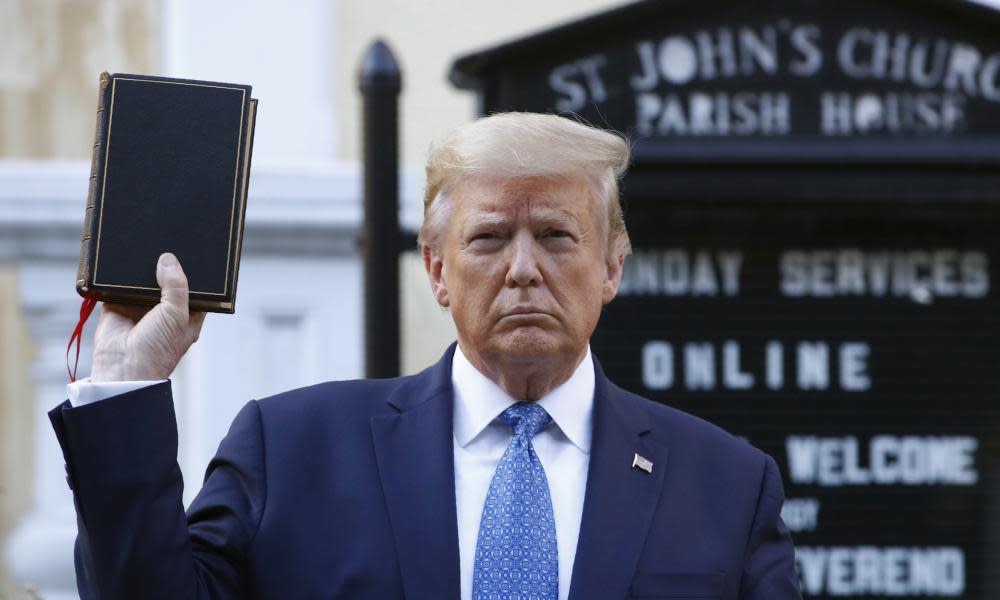The Guardian view on Trump and the Christian vote: doubting Donald

Donald Trump has suggested that the Bible is his favourite book. When pressed to say more, he has shiftily declined to name a single chapter or verse. But for those curious to understand Mr Trump’s current religious preoccupations, his Twitter feed is offering regular enlightenment in the lead-up to November’s presidential elections.
Last week, Mr Trump approvingly tweeted the words of a bestselling Catholic author who claimed on late-night television that American Christianity was under attack as protesters roamed the streets. The writer, Dr Taylor Marshall, moves in similar arch-conservative religious circles to another Trump favourite, Archbishop Carlo Maria Viganò, the former papal nuncio to the United States. Last month Archbishop Viganò published an open letter to Mr Trump in which he claimed that the Black Lives Matter protests that followed the death of George Floyd were orchestrated by “deep state” operatives. Describing the protests as part of an assault on the values of western Christian civilisation, the archbishop praised the president for robustly opposing “the children of darkness” who were threatening the social fabric. Mr Trump tweeted that he was honoured by the archbishop’s letter and hoped “everyone, religious or not, reads it”.
That the US president should get along famously with religious conspiracy theorists and renegade archbishops (Archbishop Viganò was sidelined in 2018 by Pope Francis) should come as no surprise. Mr Trump’s worldview is quintessentially Manichaean, devoted to sowing division and mobilising discord for his own political ends; he also has a taste for the apocalyptic, as demonstrated in his “American carnage” inauguration speech. But his interest in the Bible is driven above all by polling numbers. Amid falling overall ratings, Mr Trump’s advisers have calculated that if the president is to win a second term, he must, at the very least, match the high levels of white Christian support achieved four years ago. As a result, Mr Trump is hugging the religious right close as November approaches.
It worked in 2016, when 81% of white evangelicals voted for him. But this time around it appears that religious momentum is flagging. Polling published last week indicated that the numbers have dipped not only among white evangelicals, but among white Catholics and other Christian denominations too. Even the president’s brazen Bible-brandishing moment last month, outside St John’s church in Washington DC, failed to halt the relative decline.
The president has not been helped by the identity of his opponent. If he wins, Joe Biden will be only the second Catholic since John F Kennedy to occupy the White House. Mr Biden is significantly more popular among evangelicals than Hillary Clinton and has an authentic religiosity that Mr Trump’s fake bombast cannot match. There are also signs that the combination of the coronavirus pandemic and the aftermath of the death of George Floyd has shifted the dial of American politics. On race and criminal justice issues in particular, public opinion has been moving at pace in a liberal direction. It may be that Mr Biden’s frequent campaign references to Christian forgiveness and compassion now have a purchase that they would once have lacked.
Between now and November, Trump’s campaign will target his opponent’s record on abortion, on which he has moved to a pro-choice position. But using Christianity as a battering ram in the culture wars appears to be delivering diminishing returns for the current incumbent of the White House. Archbishop Viganò may be on Mr Trump’s side. Others are losing the faith.


